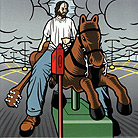May 2003
"H," the gentle, melodic opening tune, contains key features we find elsewhere in Don Quixote, while also setting us up for surprise. Like some other successful love songs, it is played in waltz time. Like many songs in the Woody Guthrie tradition, it is performed with just voice and simple and straightforward accompanying guitar minimally ornamented mainly with a basic technique known as "hammering." "I’m out Thursday night late / In one of three or four states / And I wish I were where you are": Traveling to survive as a musician costs the sustained love a human being needs. But life on the road or off enriches because of, as much as despite, loss and isolation: "Though freedom can feel lonesome beneath sheets of raw stars / It’s not sorrow from feeling hollow that so tears at my heart." The more complex "Kaldonia," with a verse structure and some phrases so closely mimicking Bob Dylan -- "I was paralyzed and cursed from the first" -- that it’s frightening, elaborates on the benefit of treasuring loss and separation for the sensation, awareness, and love they heighten. Between those two tracks that embody key aspects of Davidson’s work, surprise! -- "Kill All Love Songs" rears up with an Allman Brothers-like introduction, stomps about with a quick, tight, loud garage-band sound, and rails about "a sing-along sound-byte nation" -- starting with one of the great American poem openings, that of Allen Ginsberg’s Howl: "I saw the best minds of my generation …." Though not ambitious or earth-shaking like Howl, the song is original and clever. Davidson’s social consciousness is one of the things he is known for. Though I value songs of protest that need to be sung and are also well crafted, and though I’ve only discovered a handful in recent years, I don’t find Davidson’s to be among his best songs the way those by writers who influence him are among their best. But they hold their own. And they mostly are not too obvious or maudlin, as other writers’ attempts at this deceptively difficult genre often are. Sure, his harmonica sounds even more like Dylan than some of his writing, and he owes much to Dylan, Guthrie, and others, but Davidson’s waving his borrowings like flags seems to say, So what? This causes the listener to think, as with such early Dylan tunes as "Let Me Die in My Footsteps" or "Song to Woody," that maybe the songs here offer so much that the imitation is part of the art and is subsumed within a larger whole that carries its own weight. I think that is the case here -- I think Davidson is the real thing. And whether or not you buy the disc, you have got to have a look at its cover illustrations by Mark Dancey. They’re so richly amusing that I won’t spoil the surprise by describing them. GO BACK TO: |
 Ethan Daniel Davidson - Don Quixote de Suburbia
Ethan Daniel Davidson - Don Quixote de Suburbia Ethan Daniel Davidson’s
fifth CD, Don Quixote de Suburbia, is remarkable in many ways, some of them
paradoxical. A wide-ranging yet focused songwriting talent gives the disc its compelling
substance and surprising variety. Artistic seriousness is undercut by lyrics critical of
the person making the art. Opportunities to downplay previous artists’ influence are
rejected in favor of blatant imitation of great writers and performers. An engaging
singing voice moves among the songs confidently, with a spontaneity that softens the
material’s self-consciousness.
Ethan Daniel Davidson’s
fifth CD, Don Quixote de Suburbia, is remarkable in many ways, some of them
paradoxical. A wide-ranging yet focused songwriting talent gives the disc its compelling
substance and surprising variety. Artistic seriousness is undercut by lyrics critical of
the person making the art. Opportunities to downplay previous artists’ influence are
rejected in favor of blatant imitation of great writers and performers. An engaging
singing voice moves among the songs confidently, with a spontaneity that softens the
material’s self-consciousness.